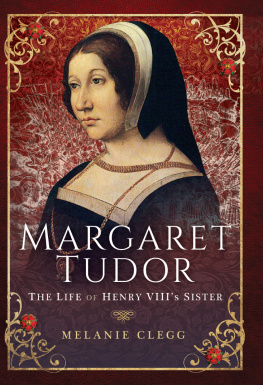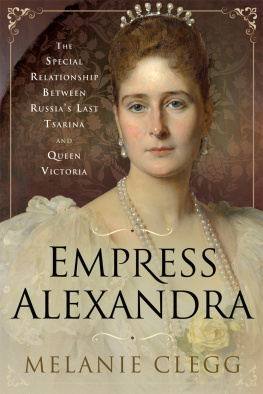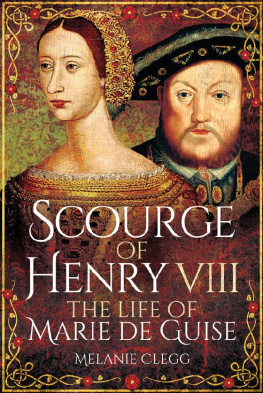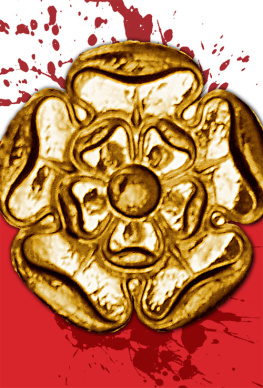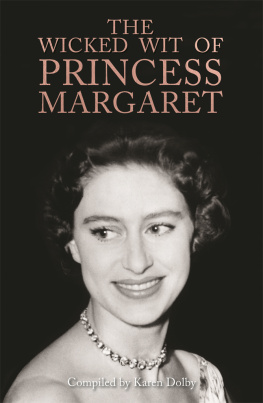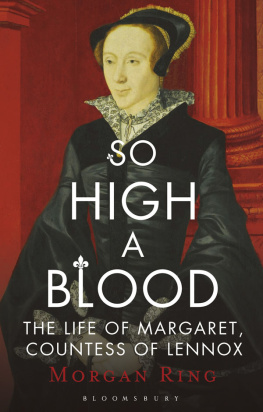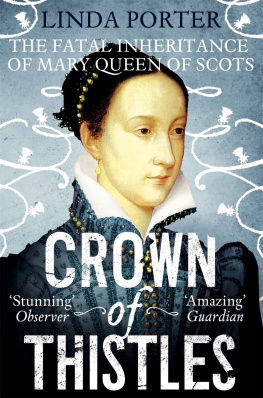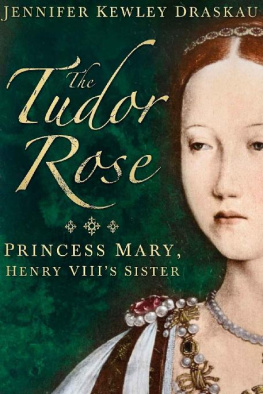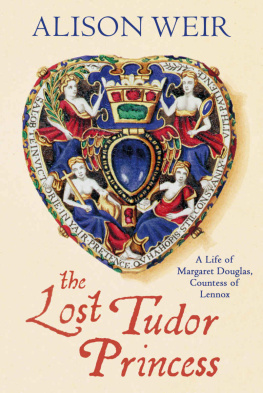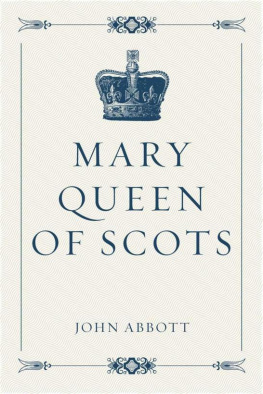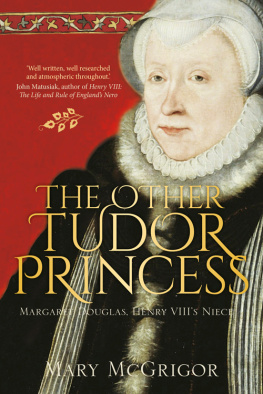Pagebreaks of the print version

MARGARET TUDOR
MARGARET TUDOR
THE LIFE OF HENRY VIIIS SISTER
MELANIE CLEGG
First published in Great Britain in 2018 by
PEN AND SWORD HISTORY
an imprint of
Pen and Sword Books Ltd
47 Church Street
Barnsley
South Yorkshire S70 2AS
Copyright Melanie Clegg, 2018
ISBN 978 1 47389 315 3
eISBN 978 1 47389 317 7
Mobi ISBN 978 1 47389 316 0
The right of Melanie Clegg to be identified as the author of this work has been asserted by them in accordance with the Copyright, Designs and Patents Act 1988.
All rights reserved. No part of this book may be reproduced or transmitted in any form or by any means, electronic or mechanical including photocopying, recording or by any information storage and retrieval system, without permission from the Publisher in writing.
Aura Technology and Software Services, India
Pen & Sword Books Ltd incorporates the imprints of Pen & Sword
Archaeology, Atlas, Aviation, Battleground, Discovery,
Family History, History, Maritime, Military, Naval, Politics, Railways,
Select, Social History, Transport, True Crime, Claymore Press,
Frontline Books, Leo Cooper, Praetorian Press, Remember When,
Seaforth Publishing and Wharncliffe.
For a complete list of Pen and Sword titles please contact
Pen and Sword Books Limited
47 Church Street, Barnsley, South Yorkshire, S70 2AS, England
E-mail:
Website: www.pen-and-sword.co.uk
Acknowledgements
I first became interested in the life of Margaret Tudor while I was writing about her daughter-in-law Marie de Guise, and eventually decided that it made sense to focus specifically on her at some point in the future. Although she deserves her place in history books thanks to the important role that she played in sixteenth-century royal politics and also, more specifically, the drama surrounding the Tudor succession after Henry VIII, Margaret has rarely had the attention that the rest of her family have enjoyed and when she has merited a mention, has received a pretty hard time from historians thanks to her poor decision-making and the chaos of her marital history. Having said that, the main reason I found Margaret so fascinating was the way that her story often mirrored that of her granddaughter Mary Queen of Scots, who could have learned a great deal from the misfortunes that befell her and yet never quite did.
As always this book is dedicated to my amazing friends, who have put up with months of complaining while I completed this book; my lovely boys, who took absolutely no interest whatsoever but might have paid a bit more attention if Margaret was a character in Assassins Creed, and Simon Hayden, who is still persevering with the cups of tea, even if I never actually drink them. In fact, I have one cooling next to me at this very moment. Sorry Simon!
Above all though, Id like to dedicate this book to Margaret herself. One of the things I noticed during my research was that there were no contemporary mentions of her having any friends, with I thought was really sad. Both Marie de Guise and Henrietta Anne, my last two subjects, were singularly blessed with their friendships and clearly had no problems at all inspiring affection and loyalty in those who came into close contact with them even, on occasion, with people who really did not want to like them. They both had their problems, but were constantly buoyed up by the love and support of their close knit families and friends, whereas poor Margaret doesnt seem to have had anyone on her side. I kept finding myself shaking my head and thinking: Good grief, this woman really needed some friends to stage an intervention or just take her out for a drink, when I was writing so I think it only right to dedicate the book to her with the very late-in-theday offer to be her friend, get her drunk and delete Archibald Douglass number from her phone and probably tell her brother Henry to get lost too.
Chapter 1
The Rise of the Tudors 14851489
Margaret Tudors future fate, and that of all her siblings, was decided on a field near Leicester on 22 August 1485 when her father Henry Tudor, Earl of Richmond, defeated and killed the last Yorkist King Richard III and seized the crown of England for himself. Although Henrys claim to the throne was so negligible as to be virtually non-existent, the strength of his supporters and decisiveness of his victory meant that his extraordinary rise to supreme power was largely uncontested. Henrys coup was made all the more concrete when he announced his intention to take Richards eldest niece Elizabeth of York as his wife, using her as the means to bring the last remaining Yorkist supporters to heel. This match, secretly brokered by the putative couples respective mothers and which had seemed so desirable when the ambitious pretender Henry was canvassing for support before his invasion of England, was actually as problematic as everything else about his quest for power Richard IIIs claim to the throne had been based on the Titulus Regius , an official edict which presented as indisputable fact the dubious tale that his brother, Elizabeths father Edward IV had already been secretly married to another aristocratic beauty, Lady Eleanor Butler when he took her mother Elizabeth Woodville as his wife, which meant that the ten children that this fruitful royal marriage had produced were all in fact illegitimate and as such, had as little claim to the throne as Henry, the descendant of John of Gaunts extra-marital liaison with Katherine Swynford, himself.
The issue was further complicated by the fact that Elizabeths younger brothers, Edward V and Richard, Duke of York, had not been seen since 1483 and were presumed dead, possibly murdered by their uncle Richard as part of his own bid for power although the boys could just as easily have died of natural causes in the fetid atmosphere of the Tower of London. Naturally it suited Henry very well if the boys were assumed to be long-dead, but persistent rumours that either one or both of them had survived would continue to dog his reign and cast doubts upon his own right to rule. It also suited him to temporarily leave the five surviving daughters of Edward IV and Elizabeth Woodville in limbo by refusing to immediately reverse the official edict that had rendered them all illegitimate and removed them from the succession. Although it must surely have occurred to a man as cunning and intelligent as Henry Tudor that it might be better for him to repudiate his betrothal with Elizabeth and instead pursue a more prestigious match with a French noblewoman, cementing his friendship with Charles VIII, he stood firm her prestige may have been harmed by the controversy surrounding her parents marriage but Elizabeth still had enormous value to Henry as the eldest surviving Yorkist heir, while her suitability to rule at his side was undisputed. Elizabeth, blessed with all the good health, intelligence and beauty of her famously charming and good looking parents, had been carefully reared since birth to one day wear a crown at the age of 9 she had been betrothed to the Dauphin of France and, until the marriage was called off seven years later, had been encouraged to think of herself as the future Queen of France.
However, any Yorkist diehards who had expected Henry to immediately reestablish Elizabeths legitimacy and status before claiming the throne on her behalf were doomed to disappointment. Although well aware of his own poor claim to the throne, Henry was nonetheless determined to make it clear from the start that all power devolved to him, and that he alone was the rightful monarch. While another man might have sought to reinforce such a weak claim by underlining the dynastic rights of his wife, Henry, who was no fool, decided that his best chance of retaining the crown that he had fought so long and hard for was to tough it out and refuse to neither apologise for or even acknowledge the weakness of his claim. It isnt known what Elizabeth thought of this, but in public at least she never behaved with anything other than meek acquiescence to her husbands will. She may have been brought up to be a queen one day, but she had also been carefully reared, like all noblewomen of her time, to cede all authority to her husband and this she proceeded to do, apparently totally content to be demoted to the rank of consort rather than joint ruler.

